Spoiled Rotten
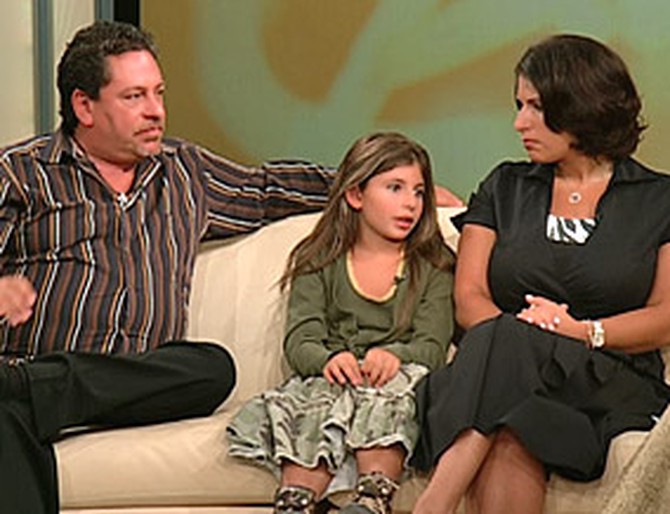
Experts say we are raising the most overindulged generation in the history of this country—and that many parents don't realize giving kids everything they want can actually ruin their lives. In fact, it's believed that saying "no" to your child could actually be the most loving thing you can do as a parent.
Todd and Lisa said their daughter, Hannah, was spoiled and difficult, and her explosive tantrums were wreaking havoc in their home.
Lisa said Hannah tormented her nannies trying to get them to quit, and switched schools because of her behavior. To keep the peace, Lisa gave Hannah whatever she wanted. "I think I wanted to give her everything," Lisa said. "It's also I wanted to be her best friend, and I wanted her to trust me."
But Todd had reached his limit, often losing his temper and yelling at the family. "I love my family, I just can't do this anymore," Todd says.
With their marriage now on the rocks and their daughter out of control, the family needed help.
Todd and Lisa said their daughter, Hannah, was spoiled and difficult, and her explosive tantrums were wreaking havoc in their home.
Lisa said Hannah tormented her nannies trying to get them to quit, and switched schools because of her behavior. To keep the peace, Lisa gave Hannah whatever she wanted. "I think I wanted to give her everything," Lisa said. "It's also I wanted to be her best friend, and I wanted her to trust me."
But Todd had reached his limit, often losing his temper and yelling at the family. "I love my family, I just can't do this anymore," Todd says.
With their marriage now on the rocks and their daughter out of control, the family needed help.
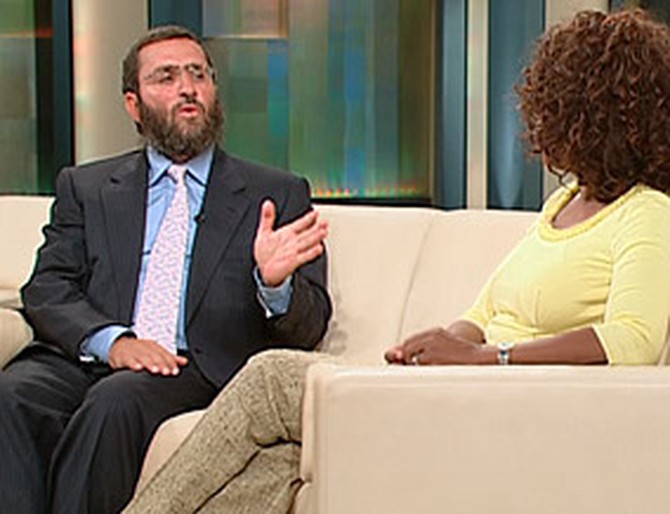
Rabbi Shmuley Boteach of TLC's Shalom in the Home says that although Todd and Lisa are loving parents who adore their child, the issues in their marriage were affecting the whole family.
The rabbi videotaped the family in action and focused on Todd and Lisa's fighting to teach them a very important lesson—what arguing in front of children can do to them.
"They're very vulnerable, and they absorb that volatility. And suddenly instead of having peace at their center, which children should have, they have chaos at their center," Rabbi Shmuley says. "You rob them of their innocence. They're seeing things that children should never see."
The rabbi videotaped the family in action and focused on Todd and Lisa's fighting to teach them a very important lesson—what arguing in front of children can do to them.
"They're very vulnerable, and they absorb that volatility. And suddenly instead of having peace at their center, which children should have, they have chaos at their center," Rabbi Shmuley says. "You rob them of their innocence. They're seeing things that children should never see."
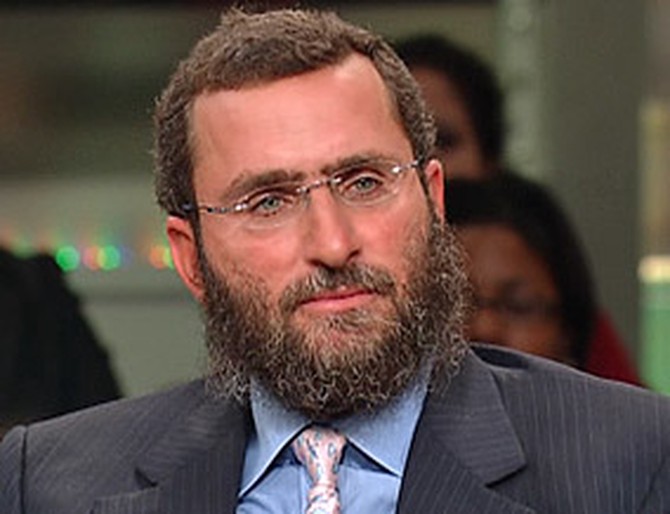
Shmuley says we can't just blame kids for acting bratty or spoiled. Kids today, he says, are exhibiting a lot of anger because they feel neglected by parents who may put careers ahead of family.
"The one thing that kids need in huge doses is love," Shmuley says. "They're insatiable for it. They're not getting it."
Shmuley says parents have a hard time teaching discipline and respect for others because of three factors affecting many families.
1. Exhaustion: Parents can't say no because they don't have the energy to do so.
2. Guilt: Not being able to give more of their time, parents often give material gifts instead.
3. A Loveless Society: Shmuley says that "we don't live in a very loving society. People come from broken childhoods, they often have loveless marriages. The only love they get is from their children, so they're afraid to discipline them because they think their children won't love them."
Parents, Shmuley says, need to realize that discipline is love. "'No' is just as loving as saying 'yes,'" he says.
"The one thing that kids need in huge doses is love," Shmuley says. "They're insatiable for it. They're not getting it."
Shmuley says parents have a hard time teaching discipline and respect for others because of three factors affecting many families.
1. Exhaustion: Parents can't say no because they don't have the energy to do so.
2. Guilt: Not being able to give more of their time, parents often give material gifts instead.
3. A Loveless Society: Shmuley says that "we don't live in a very loving society. People come from broken childhoods, they often have loveless marriages. The only love they get is from their children, so they're afraid to discipline them because they think their children won't love them."
Parents, Shmuley says, need to realize that discipline is love. "'No' is just as loving as saying 'yes,'" he says.
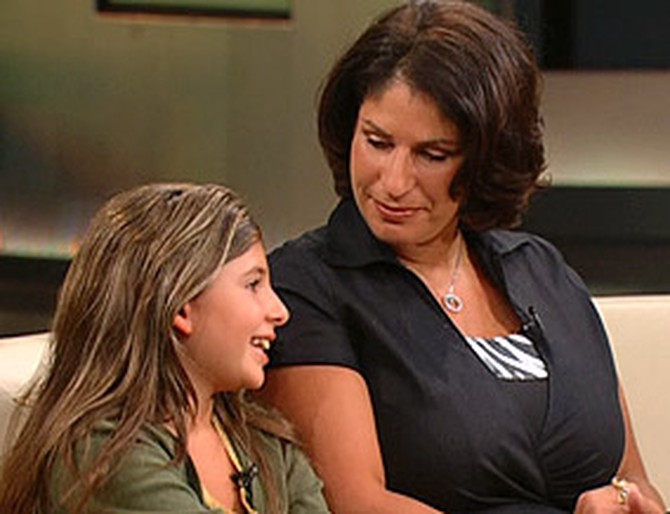
Todd and Lisa both felt Hannah ruled their household and their marriage. After seeing themselves on tape, the family decided to turn their situation around. "I woke up," Lisa says.
Todd now makes an effort to control his anger and frustration. "I try to walk out of the room if there's problems, instead of allowing something to blow up. And most importantly, not sweating the small stuff," Todd says.
Lisa and Todd are also parenting together. "Nothing happens overnight, but we've made a lot of strides to make things positive in our family home," Todd says.
Perhaps the biggest stride is Lisa learning to be Hannah's mother, not her friend.
"How do you feel about that?" Lisa asks Hannah.
"I hate it," Hannah says.
"But you know what? That makes me feel really good," Lisa says.
Todd now makes an effort to control his anger and frustration. "I try to walk out of the room if there's problems, instead of allowing something to blow up. And most importantly, not sweating the small stuff," Todd says.
Lisa and Todd are also parenting together. "Nothing happens overnight, but we've made a lot of strides to make things positive in our family home," Todd says.
Perhaps the biggest stride is Lisa learning to be Hannah's mother, not her friend.
"How do you feel about that?" Lisa asks Hannah.
"I hate it," Hannah says.
"But you know what? That makes me feel really good," Lisa says.
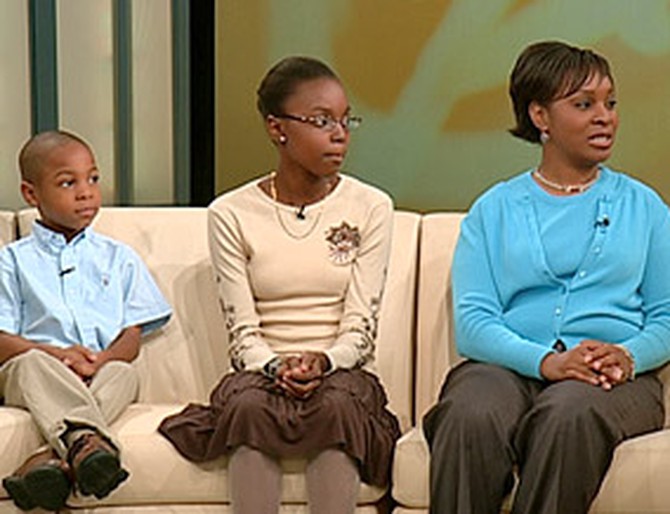
Rebecca knows that she spoils her kids. As a divorced mother of two who works a full-time job, she cannot spend as much time with her son and daughter as she would like. "A lot of times I feel like I am mom and dad to both of my children," she says.
Because she feels guilty about not spending enough time with them, Rebecca says she tends to "overcompensate when they ask me for things...so I overindulge."
Rebecca's children have developed certain techniques to get the things they want. Her 5-year-old son, Brandon, uses "sad eyes." Her daughter, Stephanie, uses peer pressure. "If I really want to get something from my mom," Stephanie says, "I'll come home and I'll be like, 'Mom, all my friends have [it].'"
Rebecca says her inability to deny her children's every want is getting out of control. "I want to say no, but it comes out yes," she says.
Because she feels guilty about not spending enough time with them, Rebecca says she tends to "overcompensate when they ask me for things...so I overindulge."
Rebecca's children have developed certain techniques to get the things they want. Her 5-year-old son, Brandon, uses "sad eyes." Her daughter, Stephanie, uses peer pressure. "If I really want to get something from my mom," Stephanie says, "I'll come home and I'll be like, 'Mom, all my friends have [it].'"
Rebecca says her inability to deny her children's every want is getting out of control. "I want to say no, but it comes out yes," she says.

Dr. Robin says that Rebecca is trying to make up for her perceived inadequacy as a single working mom by showering Brandon and Stephanie with gifts. This places so much emphasis on material goods that the children are learning to define themselves by material things.
"If they were to lose everything—if the rug gets pulled from underneath us—you've got to be able to still know that you are good enough," Dr. Robin says. "Right now, if they lose things, they're going to feel empty."
The solution to guilt, Dr. Robin says, won't come from stuff. "I want you to really recognize that what you're trying to do, which is to love them, to make up for your not being there, you can't do it with things. Things will never satisfy and never fill the sacred hole that only a mom and dad can do."
As for Rebecca's struggles as a single mom, Dr. Robin says, "You can't be dad, just be a good mom. Or if you're a dad, just be a good dad. Fill your own sense of being good enough and satisfied and that it's not about what you have...and then you can feel good about yourself."
"If they were to lose everything—if the rug gets pulled from underneath us—you've got to be able to still know that you are good enough," Dr. Robin says. "Right now, if they lose things, they're going to feel empty."
The solution to guilt, Dr. Robin says, won't come from stuff. "I want you to really recognize that what you're trying to do, which is to love them, to make up for your not being there, you can't do it with things. Things will never satisfy and never fill the sacred hole that only a mom and dad can do."
As for Rebecca's struggles as a single mom, Dr. Robin says, "You can't be dad, just be a good mom. Or if you're a dad, just be a good dad. Fill your own sense of being good enough and satisfied and that it's not about what you have...and then you can feel good about yourself."
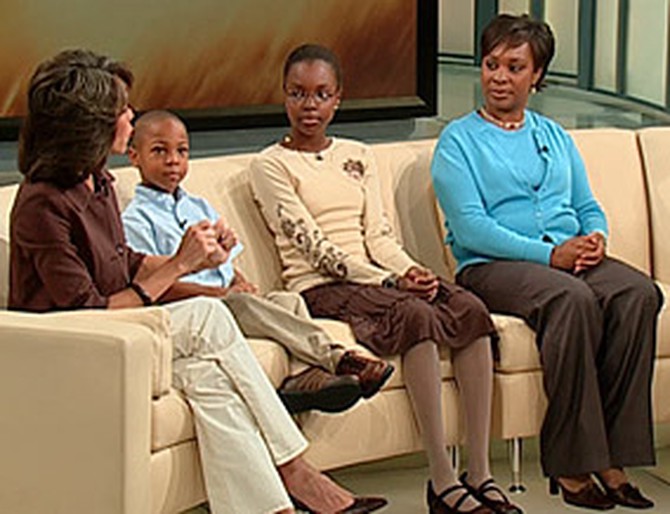
Do you think your inability to say no is harming your kids? These are three questions you need to ask yourself.
Do your children "earn" the things they get?
Some parents "reward" children who aren't actually doing anything to earn a reward. Dr. Robin says chores are a good way to instill a reward system, even in a 5-year-old. "He could pick up his toys in his room; he could pick up his clothing; he could help his mother take the trash out," she says. "Not because you need [the help], but because it's cultivating being competent and thoughtful."
Does your child value "things" more than people?
Unchecked, a craving for possessions will become insatiable, Dr. Robin says. When this happens, it can stifle real emotional development. "I'm not really interested in whether or not I'm building great, healthy relationships," Dr. Robin says. "I'm interested in how many more gadgets I get."
Are you trying to soothe your child with things?
While new clothes and toys might make your child happy temporarily, that happiness will not last. "I don't want them to be just happy now. I want them to become whole individuals," Dr. Robin says.
Do your children "earn" the things they get?
Some parents "reward" children who aren't actually doing anything to earn a reward. Dr. Robin says chores are a good way to instill a reward system, even in a 5-year-old. "He could pick up his toys in his room; he could pick up his clothing; he could help his mother take the trash out," she says. "Not because you need [the help], but because it's cultivating being competent and thoughtful."
Does your child value "things" more than people?
Unchecked, a craving for possessions will become insatiable, Dr. Robin says. When this happens, it can stifle real emotional development. "I'm not really interested in whether or not I'm building great, healthy relationships," Dr. Robin says. "I'm interested in how many more gadgets I get."
Are you trying to soothe your child with things?
While new clothes and toys might make your child happy temporarily, that happiness will not last. "I don't want them to be just happy now. I want them to become whole individuals," Dr. Robin says.
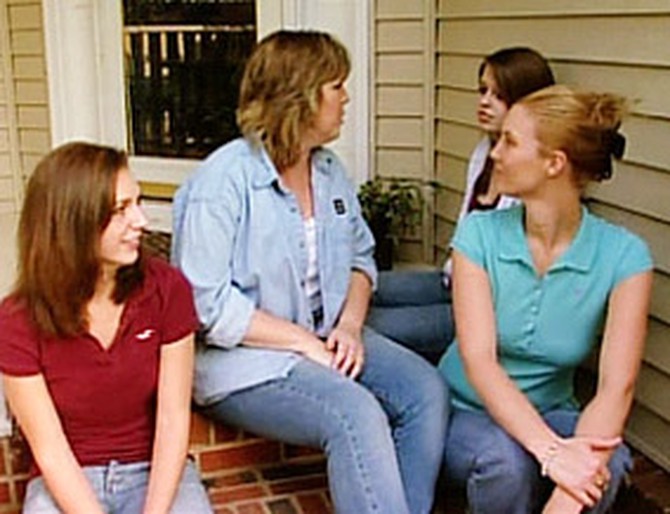
Like Rebecca, Jeri can't seem to say no to her kids. Not only do Jeri's two teenaged daughters manipulate her, so does her married 23-year-old daughter.
Four and half months ago, Jennifer and her husband moved into a second home her parents own, under the agreement that she would pay rent. So far she hasn't paid anything. When Ashley turned 16, she wanted a sporty car. Though Jeri told Ashley she needed to get a job to pay for it, after a year and a half Jeri still pays for the insurance and the gas. Jaime sticks to asking her mom for "important stuff—like shoes," she says.
Jeri says she wants to put her foot down, but she just can't say no. And at the end of every month, she says she finds herself strapped for cash.
Four and half months ago, Jennifer and her husband moved into a second home her parents own, under the agreement that she would pay rent. So far she hasn't paid anything. When Ashley turned 16, she wanted a sporty car. Though Jeri told Ashley she needed to get a job to pay for it, after a year and a half Jeri still pays for the insurance and the gas. Jaime sticks to asking her mom for "important stuff—like shoes," she says.
Jeri says she wants to put her foot down, but she just can't say no. And at the end of every month, she says she finds herself strapped for cash.
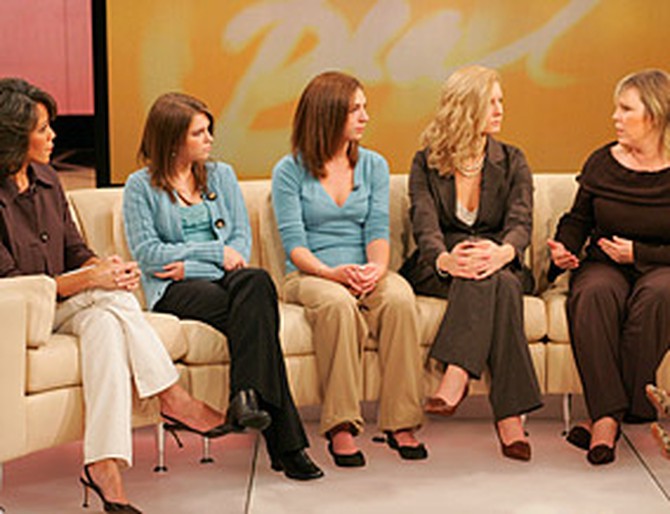
Dr. Robin says Jeri must consider the lessons her daughters are learning. They're completely unable to fend for themselves, and their ability to feel a sense of personal accomplishment has been removed. "You're teaching them, in some ways, how to be victims of you."
At the core, Dr. Robin says, the problem is that Jeri spoils Jennifer, Ashley and Jaime in order to avoid something. "And I want to know, what are you trying to avoid?" Dr. Robin asks.
"I wonder sometimes maybe if I don't do what they want me to do, maybe they won't love me as much," Jeri says.
"I know that's a strong concept, but we need to talk strong because their lives are at stake," Dr. Robin says. "You could actually, although you want to help them, create cripples."
At the core, Dr. Robin says, the problem is that Jeri spoils Jennifer, Ashley and Jaime in order to avoid something. "And I want to know, what are you trying to avoid?" Dr. Robin asks.
"I wonder sometimes maybe if I don't do what they want me to do, maybe they won't love me as much," Jeri says.
"I know that's a strong concept, but we need to talk strong because their lives are at stake," Dr. Robin says. "You could actually, although you want to help them, create cripples."

Dr. Robin wants to redefine what it means to love a child. "Part of loving your children is to give them boundaries," she says. "What we've seen today is what creates failure." Instead of giving your children everything they want, Dr. Robin wants parents to start living by a "golden rule."
"When you say no, you must mean it and stick to it—period," she says. "If [a parent's] word means nothing, it means that there's no respect. If I'm not respecting you, then I'm disrespecting you.... If you can't live it, your kids can sniff it out."
"When you say no, you must mean it and stick to it—period," she says. "If [a parent's] word means nothing, it means that there's no respect. If I'm not respecting you, then I'm disrespecting you.... If you can't live it, your kids can sniff it out."
Published 10/06/2006

